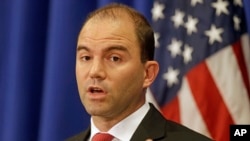A top White House official said the nuclear deal the U.S. reached with Iran has created a new diplomatic tone between both nations that helped in the release last week of 10 American sailors who were detained briefly in Iran as well as five other American citizens who had been held for years.
Ben Rhodes, deputy national security adviser to President Barack Obama, told an event organized by the Georgetown University Institute of Politics and Public Service in Washington that the nuclear deal between the U.S. and five other Western nations and Iran made it easier for diplomats of both countries to communicate in a “much healthier, more functional way.”
Rhodes said the latest example of this new diplomatic era was in evidence last week when 10 U.S. sailors drifted in a vessel into Iranian waters due to engine problems.
“I don’t know where that incident would’ve led four years ago," he said.
Communication
"You have U.S. Navy personnel in Iranian waters and you could easily see how in 2009 or 2011 it could have escalated … [and] it becomes a crisis because it is a public issue in both countries … where as here [Secretary of State] John Kerry called [Iran’s Minister of Foreign Affairs Mohammad] Javad Zarif and they were released in a few hours,” Rhodes said.
Last weekend, former U.S. Marine Amir Hekmati, Washington Post reporter Jason Rezaian, pastor Saeed Abedini, student Matthew Trevithick and Nosratollah Khosravi-Roodsari were all released after extended negotiations to win their freedom from Iranian captivity.
Rhodes described the convoluted old system of diplomatic communication between Washington and Tehran.
He said that a few years ago the U.S. United Nations ambassador would talk to Iran’s United Nations ambassador. That message would later be sent to Tehran and then Iran would send a response to the U.S. Interests Section inside the Swiss Embassy in the Iranian capital, and later it would reach the White House and the State Department.
“The nuclear negotiations established diplomacy and diplomatic channels between the two countries that just did not exist three years ago. And that doesn’t mean that there is a change in behavior. It does mean, though, that we can communicate with this government,” Rhodes said.
Republicans in Congress and on the presidential campaign trail have been highly critical of the Iran nuclear deal.
GOP front-runner Donald Trump has called it "the dumbest deal I think I've ever seen."
'Not legally binding'
Republican Senate Majority Whip John Cornyn of Texas said the issue is not settled.
"This is not legally binding beyond the presidency of Barack Obama. This is not a legal document. It's not a treaty. It's a political agreement. And so I hope the next president understands that he or she will have complete freedom to tear this deal up and negotiate a better deal," Cornyn said.
On Tuesday, Iran had access to more than $30 billion in frozen assets from sanctions.
The United States and the European Union put the sanctions in place to pressure Iran amid allegations it was working to develop nuclear weapons. The sanctions badly hurt Iran's economy, and lifting them was what Iran got in return for sharply cutting back its nuclear program in the deal with world powers.
Rhodes acknowledged that confrontations between both nations are unavoidable.
“There are going to be other issues, there are going to be irritants. There are just going to be things that come up that will benefit from diplomatic communication between the United States and Iran," he said.













